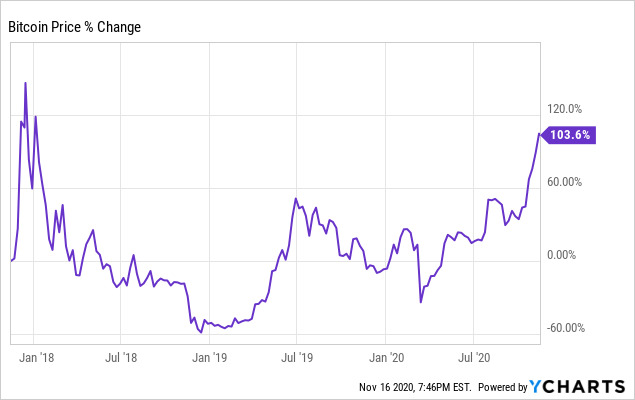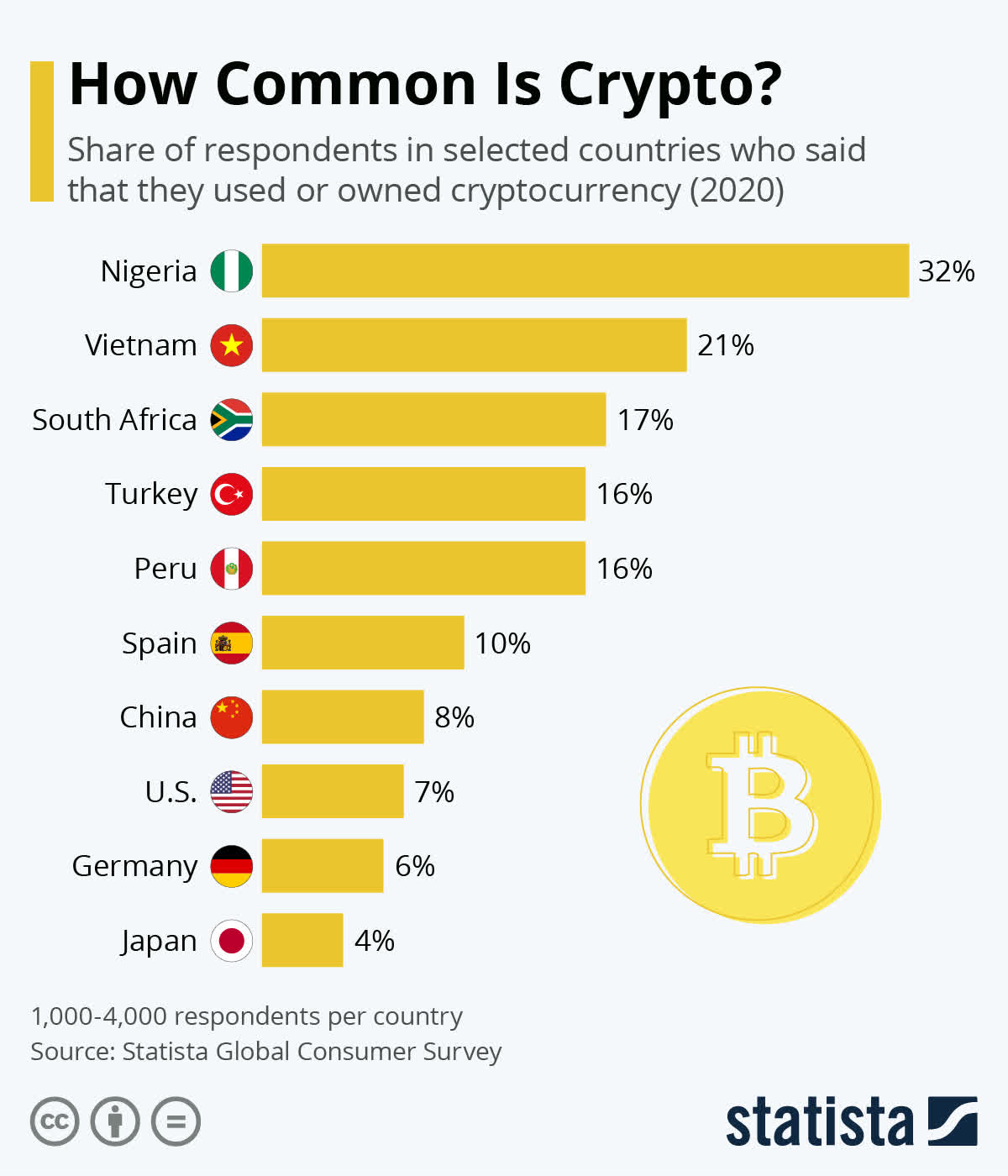Summary
The rise of bitcoin is textbook supply and demand. Since supply is fixed and more and more institutional investors and end-users are adopting bitcoin, the price has surged.
The positive feedback loop with bitcoin appears to be getting stronger over time as adoption increases. The theoretical justification for this is known as Metcalfe's Law.
With much of the world's population under the thumb of authoritarian governments, demand for bitcoin will only grow.With commodities like oil, when prices rise, producers can increase production and therefore increase supply. This causes their prices to revert to the mean.
This effect is absent in bitcoin.In the 1970s and early 1980s, a young entrepreneur named Robert Metcalfe (pictured below) proposed that a simple equation would be responsible for explosive growth in the value of technology.
You may not have heard of him before reading this, but he's best known for inventing the Ethernet cable. Today, he's a venture capitalist and a professor at
the University of Texas
.
Metcalfe theorized that the value of a network is roughly proportional to the square of the number of users who adopt it. To give an example, if you were the only person in the world with a smartphone, it wouldn't be super useful because you couldn't reach anyone.
However, as the adoption of smartphones grew over time, the value of the network grew proportionally. Today, the world's most valuable company, Apple (AAPL) has ridden this exact wave. Much of the explosive growth of technology companies can be attributed to so-called network effects, where every new person who joins a network makes the network more valuable.
Network effects made young geeks far richer far faster than the titans of industry before them. Network effects apply in many areas where people don't expect them.
They apply socially, as friends introduce friends, bringing opportunities for business (and romance). This is where the term networking came from. Network effects allow places like Harvard (from where Metcalfe got his Ph.D.) to charge more than the average person makes in a year for tuition, room, and board. The English language itself benefits from a network effect.
Nowhere are network effects more apparent, however, than in cryptocurrency. With Bitcoin (BTC-USD) being the dominant cryptocurrency, it's the most likely to benefit. Research has shown that much of the increase in the value of bitcoin can be attributed to network effects.
The first commercial transaction of bitcoin apparently was by software developer Laszlo Hanyecz, who traded 10,000 BTC for a pizza. Back then, there were few takers for bitcoin, so the trade may have seemed rational at the time until you realize that he may have inadvertently tipped his pizza guy over $100 million US dollars in today's BTC.
The same could be said for the ne'er-do-wells in my high school who also were early adopters of bitcoin, who along similar lines, accidentally traded hundreds of thousands of dollars in today's bitcoin in the early 2010s for psilocybin mushrooms and pot.
 Data by YCharts
Data by YCharts
Bob Metcalfe has made some crazy predictions in his life, some have come true, and some haven't. He famously ate a piece of paper with his words on it after making a wrong prediction in the 1990s. Metcalfe's Law has been criticized as being too simplistic.
The most valid criticism is if the value of a network doesn't increase by the square of the number of users, but rather increases by a logarithm. This is probably true to some extent.
If I and someone in China are part of the same network we're not super likely to transact in bitcoin, so the value increase is likely somewhat lower than if my neighbor down the street adopts bitcoin for part of his savings.
It is clear that the value of the network grows exponentially though when new users join. Researchers have made a strong case that the present value of Facebook (FB) was built this way.Bitcoin is also used as much or more as a store of value than a medium of exchange. PayPal (PYPL) is expanding its cryptocurrency offerings, which will bring far more interest in the currency, driving the value up and the volatility down over time.
Still, as institutional investors legitimize and adopt bitcoin, the demand for BTC is bound to increase over time. In short, more people are adopting bitcoin, and the supply is not increasing as fast as demand, causing the price to skyrocket.
In 2017, I thought bitcoin was severely overvalued. I was initially right, as I watched it zoom up to $20,000, then promptly deflate over 80 percent. Slowly, I changed my mind as the bubble faded and the process of price discovery continued.
What really changed my opinion was the pandemic, when governments around the world printed money like there was no tomorrow in order to keep everyone's bills paid. I wrote about this in June. It may not immediately be obvious, but printing money is a form of taxation, and owning bitcoin means that you're not subject to taxation via money printing.
Since printing money is quicker, more effective at raising revenue, and less likely to cause politicians to not be reelected, it's almost always going to be the way out for over-indebted governments.If you take the Fed at their word with their 2 percent inflation target, you can expect the value of the dollar to go down (.98^10) over the next 10 years.
That's a roughly 18.3 percent decrease in your purchasing power by 2030. That's because the Fed is always printing more money to keep the economy humming along and to force people to invest.
The supply of bitcoin, however, is relatively fixed. Moreover, adoption by institutional investors is rising, and billions of people still live under oppressive governments that confiscate wealth in far less subtle ways than running benign amounts of yearly inflation.
If you're reading this from your home office in a comfy suburb in the United States, the dollar may serve your interests just fine. Bitcoin is a real boon for the global middle class and a problem for authoritarian third-world governments, however, when they lose the ability to keep their people down.Look at crypto adoption for selected countries.

Source: Statista
I think that it's not a stretch to assume that bitcoin adoption could at least double within the next few years. If you take Metcalfe's initial law to heart, that's about a 4x increase in the value of bitcoin or a little over $1 trillion in market cap. Gold is around $9 trillion.
If you think the network value is lower, then bitcoin could still double or triple in fundamental value.Unlike commodities like oil, where when the price rises everyone pumps like crazy to make money, bitcoin has a fairly limited supply, setting the stage for a large increase in the value of bitcoin in the 2020s.
Good things are more likely than not to happen to those who allocate a small part of their portfolio to bitcoin. Citibank just put a $300,000 price target on bitcoin. Is it a bit hyperbolic? Sure, but they based the target on how gold has performed since the US fully came off the gold standard in the 1970s.
Bitcoin is a wickedly volatile asset. Therefore, if you invest in it, normal guidelines for investing in volatile assets apply, such as dollar-cost averaging on entry and exit to smooth out your results. Another nice risk parity trick is weighting positions negatively proportional to their volatility, meaning that instead of budgeting a dollar amount to your positions, you budget a certain amount of risk.
There are different ways to execute this, but the simplest is to allocate a small portion of your portfolio, like 5-6 percent to bitcoin.
Alternately, the accumulation of bitcoin in small frequent quantities makes a lot of sense to me. I still like gold as well, but every time a big-name investor or company endorses bitcoin, the fundamental value increases a bit.
And if the SEC allows a bitcoin ETF, those who buy now will benefit from a persistent boost in demand. So there you have it, the bitcoin bulls have won me over. Common sense still applies to risk management and sizing positions, but I'm a believer now.
The rise of bitcoin is textbook supply and demand. Since supply is fixed and more and more institutional investors and end-users are adopting bitcoin, the price has surged.
The positive feedback loop with bitcoin appears to be getting stronger over time as adoption increases. The theoretical justification for this is known as Metcalfe's Law.
With much of the world's population under the thumb of authoritarian governments, demand for bitcoin will only grow.With commodities like oil, when prices rise, producers can increase production and therefore increase supply. This causes their prices to revert to the mean.
This effect is absent in bitcoin.In the 1970s and early 1980s, a young entrepreneur named Robert Metcalfe (pictured below) proposed that a simple equation would be responsible for explosive growth in the value of technology.
You may not have heard of him before reading this, but he's best known for inventing the Ethernet cable. Today, he's a venture capitalist and a professor at
the University of Texas
.

Metcalfe theorized that the value of a network is roughly proportional to the square of the number of users who adopt it. To give an example, if you were the only person in the world with a smartphone, it wouldn't be super useful because you couldn't reach anyone.
However, as the adoption of smartphones grew over time, the value of the network grew proportionally. Today, the world's most valuable company, Apple (AAPL) has ridden this exact wave. Much of the explosive growth of technology companies can be attributed to so-called network effects, where every new person who joins a network makes the network more valuable.
Network effects made young geeks far richer far faster than the titans of industry before them. Network effects apply in many areas where people don't expect them.
They apply socially, as friends introduce friends, bringing opportunities for business (and romance). This is where the term networking came from. Network effects allow places like Harvard (from where Metcalfe got his Ph.D.) to charge more than the average person makes in a year for tuition, room, and board. The English language itself benefits from a network effect.
Nowhere are network effects more apparent, however, than in cryptocurrency. With Bitcoin (BTC-USD) being the dominant cryptocurrency, it's the most likely to benefit. Research has shown that much of the increase in the value of bitcoin can be attributed to network effects.
The first commercial transaction of bitcoin apparently was by software developer Laszlo Hanyecz, who traded 10,000 BTC for a pizza. Back then, there were few takers for bitcoin, so the trade may have seemed rational at the time until you realize that he may have inadvertently tipped his pizza guy over $100 million US dollars in today's BTC.
The same could be said for the ne'er-do-wells in my high school who also were early adopters of bitcoin, who along similar lines, accidentally traded hundreds of thousands of dollars in today's bitcoin in the early 2010s for psilocybin mushrooms and pot.
 Data by YCharts
Data by YChartsDoes Metcalfe's Law Apply to Bitcoin?
Bob Metcalfe has made some crazy predictions in his life, some have come true, and some haven't. He famously ate a piece of paper with his words on it after making a wrong prediction in the 1990s. Metcalfe's Law has been criticized as being too simplistic.
The most valid criticism is if the value of a network doesn't increase by the square of the number of users, but rather increases by a logarithm. This is probably true to some extent.
If I and someone in China are part of the same network we're not super likely to transact in bitcoin, so the value increase is likely somewhat lower than if my neighbor down the street adopts bitcoin for part of his savings.
It is clear that the value of the network grows exponentially though when new users join. Researchers have made a strong case that the present value of Facebook (FB) was built this way.Bitcoin is also used as much or more as a store of value than a medium of exchange. PayPal (PYPL) is expanding its cryptocurrency offerings, which will bring far more interest in the currency, driving the value up and the volatility down over time.
Still, as institutional investors legitimize and adopt bitcoin, the demand for BTC is bound to increase over time. In short, more people are adopting bitcoin, and the supply is not increasing as fast as demand, causing the price to skyrocket.
Supply and Demand
In 2017, I thought bitcoin was severely overvalued. I was initially right, as I watched it zoom up to $20,000, then promptly deflate over 80 percent. Slowly, I changed my mind as the bubble faded and the process of price discovery continued.
What really changed my opinion was the pandemic, when governments around the world printed money like there was no tomorrow in order to keep everyone's bills paid. I wrote about this in June. It may not immediately be obvious, but printing money is a form of taxation, and owning bitcoin means that you're not subject to taxation via money printing.
Since printing money is quicker, more effective at raising revenue, and less likely to cause politicians to not be reelected, it's almost always going to be the way out for over-indebted governments.If you take the Fed at their word with their 2 percent inflation target, you can expect the value of the dollar to go down (.98^10) over the next 10 years.
That's a roughly 18.3 percent decrease in your purchasing power by 2030. That's because the Fed is always printing more money to keep the economy humming along and to force people to invest.
The supply of bitcoin, however, is relatively fixed. Moreover, adoption by institutional investors is rising, and billions of people still live under oppressive governments that confiscate wealth in far less subtle ways than running benign amounts of yearly inflation.
If you're reading this from your home office in a comfy suburb in the United States, the dollar may serve your interests just fine. Bitcoin is a real boon for the global middle class and a problem for authoritarian third-world governments, however, when they lose the ability to keep their people down.Look at crypto adoption for selected countries.

Source: Statista
I think that it's not a stretch to assume that bitcoin adoption could at least double within the next few years. If you take Metcalfe's initial law to heart, that's about a 4x increase in the value of bitcoin or a little over $1 trillion in market cap. Gold is around $9 trillion.
If you think the network value is lower, then bitcoin could still double or triple in fundamental value.Unlike commodities like oil, where when the price rises everyone pumps like crazy to make money, bitcoin has a fairly limited supply, setting the stage for a large increase in the value of bitcoin in the 2020s.
Good things are more likely than not to happen to those who allocate a small part of their portfolio to bitcoin. Citibank just put a $300,000 price target on bitcoin. Is it a bit hyperbolic? Sure, but they based the target on how gold has performed since the US fully came off the gold standard in the 1970s.
Conclusion
Bitcoin is a wickedly volatile asset. Therefore, if you invest in it, normal guidelines for investing in volatile assets apply, such as dollar-cost averaging on entry and exit to smooth out your results. Another nice risk parity trick is weighting positions negatively proportional to their volatility, meaning that instead of budgeting a dollar amount to your positions, you budget a certain amount of risk.
There are different ways to execute this, but the simplest is to allocate a small portion of your portfolio, like 5-6 percent to bitcoin.
Alternately, the accumulation of bitcoin in small frequent quantities makes a lot of sense to me. I still like gold as well, but every time a big-name investor or company endorses bitcoin, the fundamental value increases a bit.
And if the SEC allows a bitcoin ETF, those who buy now will benefit from a persistent boost in demand. So there you have it, the bitcoin bulls have won me over. Common sense still applies to risk management and sizing positions, but I'm a believer now.
-
- 1
Francisco Gimeno - BC Analyst Doubting about BTC investment? You are not the first. Common sense should be always applied. Do your own homework first. Reading many articles like this one doesn't make us believe otherwise. Everything is possible in the digital era.





